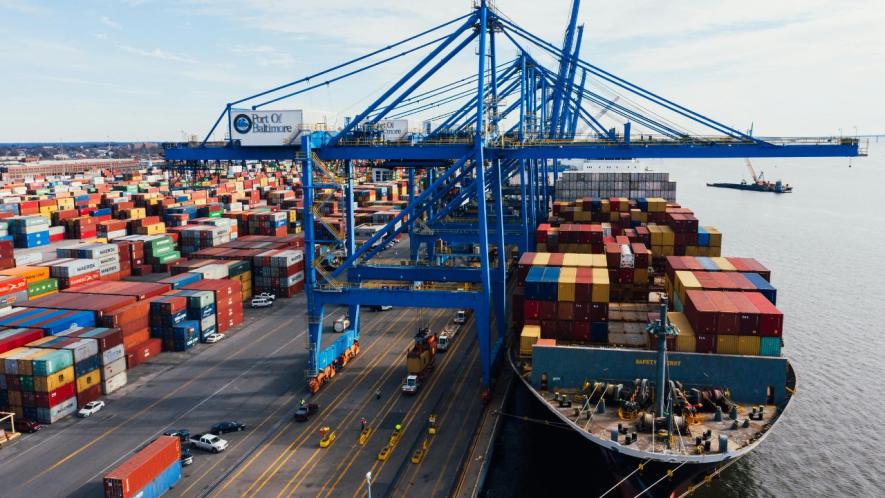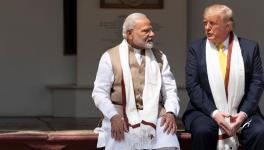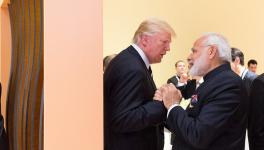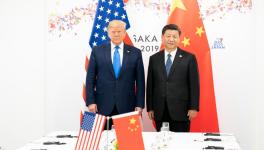Defending Sovereignty in New Trade War

Image Courtesy: Pexels
The responses in India to Donald Trump’s unilateral tariff impositions and demands regarding a trade agreement that solely favours US interests have been varied. Cosmopolitan neo-liberals (who often moonlight as neo-fascists and vice versa) tend to frame this response as a matter of policy choice (based on microeconomic cost-benefit analysis): should India continue buying discounted Russian oil (and defence equipment) and risk punitive US tariffs or give in to United States pressure to protect earnings from exports to the US?
Reducing this conflict to a neat calculation of short-term microeconomic costs and benefits obscures the concrete problem at hand. This is not merely about oil (and defence equipment) or tariffs. It is about whether India will retain even a semblance of sovereignty or submit to having a subordinate place under US hegemony.
Whether US tariffs on Indian exports to the US will reduce India's export earnings depends on whether there are alternative suppliers of the commodities in question. If there are no alternative suppliers who can outcompete Indian firms post-tariff, and if the demand for these commodities is relatively inelastic, then India's export earnings from the US will not fall post-tariff. However, if there are alternative suppliers who can outcompete Indian firms post-tariff, then India's export earnings from the US will fall post-tariff.
While higher US duties could erode export earnings to some extent, Indian firms, if supported credibly by the Indian government, can diversify their export destinations to locations other than the US. Currently, over one-fifth of India's exports go to the US.
This trade diversification will require, as a necessary condition, the integration of Indian firms into global production networks in which Chinese firms too are involved. In this regard, it needs to be mentioned that all other BRICS countries have initiated steps in the direction of trade diversification.
The US government is able to wield these threats because of structural vulnerabilities in India’s position in the global economy that owe significantly to the Indian government's strategic short-sightedness. Almost all foreign trade is US dollar-denominated. Among the BRICS countries, the current Indian government has perhaps been the most reluctant to participate in the efforts by BRICS to further de-dollarisation.
Calls to treat the present conjuncture as “another 1991 moment” and push through further sweeping neo-liberal polices betray either wilful amnesia or ideological complicity. The 1991 neo-liberal reforms deepened the country’s dependence on global capital, eroded labour protections, and hollowed out domestic industry in favour of import dependence and speculative flows.
To present further dismantling of land and labour safeguards, or deepening integration into neoliberal trade regimes, as a route to “sovereignty” is to misrepresent the very roots of India’s current strategic vulnerability. Far from insulating India from US coercion, such reforms would lock the economy even more tightly into the structures of US-centred international finance capital and leave working people more exposed to global shocks.
All this creates a leverage multiplier that allows the US government to penalise any policy move by India that it dislikes (at little cost to itself)—from energy or defence partnerships with Russia or Iran or Venezuela to participation in BRICS initiatives to trading in local currencies.
Financial coercion through secondary sanctions, exclusion from US dollar payment systems, or restrictions on correspondent banking would hit far harder than tariffs. By demanding an end to local currency trade, Washington seeks to preserve US dollar hegemony—the monetary foundation of its geopolitical power. India's interests do not lie in the preservation of US dollar hegemony.
If the current Indian government, however, does not opt for this route of diversifying trade, financial and strategic relationships with the rest of the world, then there arises the clear and present danger of India's (already shaky) strategic autonomy being decisively undermined.
Apart from the trade concessions, the deeper danger lies in the permanent concessions the US government seeks through a binding unequal trade agreement. These include intellectual property rules that extend pharmaceutical product (as opposed to process) patents and block compulsory licensing; digital governance provisions that mandate unrestricted one-way data flows and protect source code secrecy to the detriment of India; agricultural concessions opening the door to genetically modified imports and undermining the system of minimum support prices and the public distribution system, and therefore food security and food sovereignty to the detriment of peasants and workers; and procurement rules privileging US firms over domestic industry. Such setbacks, due to capitulation to US hegemony, will permanently shrink India’s policy space and disproportionately impact the working people.
Framing the oil trade question, for instance, as a choice between Russia and alternative suppliers to avoid tariffs ignores a number of issues.
First, there is the long-term solution of accelerating investment in renewable energy and modernising the national grid to gradually end fossil fuel use in a planned manner.
Second, India's agriculture must not become a playground for international corporate agribusiness. If that happens, then to begin with, Indian agricultural land will not only be (directly and indirectly) controlled by international corporate agribusiness, but the resultant increase in labour-displacing technical change will further swell the reserve army of labour.
Besides, when land use and crop composition change in response to metropolitan demand, then, as argued previously, food security and food sovereignty will be decisively undermined, as was the case during the colonial stage of the capitalist system.
The cosmopolitan neo-liberals, as expected, are claiming that the unilateral imposition of secondary sanctions by the US government is actually a golden opportunity to revive the infamous Three Farm Laws that the current Indian government was compelled to withdraw after a protracted struggle of peasants and workers. The democratic movement must exert all its powers to ensure that this hope of the cosmopolitan neo-liberals is thwarted in toto.
Why is the US government using these unilateral secondary sanctions on countries such as India? To begin with, the armed forces of the Zelensky administration in Ukraine are undergoing a process of slow collapse that is accelerating.
The US government, which is the curator of the Zelensky administration, is worried that a large-scale political and military collapse of the Zelensky administration will be an irredeemable strategic setback. This move to impose unilateral secondary sanctions is an act of strategic desperation.
Moreover, while seeking to compel India to cut ties with Russia, the US and EU continue importing Russian commodities, such as uranium and fertilisers besides oil and natural gas. In other words, even while seeking to hurt India, the US government is not willing to make even a show of shouldering even a bit of pain. Besides, the US government is hoping to obtain a face-saving way out of this desperate strategic impasse in Ukraine by entering into direct negotiations with the Russian government.
In case the current Indian government does succumb to US pressure and strategically distances itself from Russia, then an unprecedented strategic setback to Indian foreign policy will emerge. The denizens of the current Indian government must remember that the net consequences of China and Russia not working with India cannot be counterbalanced by the current Indian government's acquiescence to US hegemony for at least two reasons.
First, as the US government is learning from the trajectory of the conflict in Ukraine, dual containment of China and Russia is not possible, nor is a wedge strategy likely to succeed.
Second, as past experience demonstrates time and again, strategic proximity to the US, and therefore strategic detachment from BRICS, is a recipe for further inroads into Indian strategic autonomy.
Defending sovereignty requires more than rejecting specific US government diktats. It means dismantling the underlying conditions that make such demands possible, as previously discussed. This involves expanding BRICS local currency payment systems and bilateral currency swaps; building strategic gold reserves; and reintroducing capital controls to protect domestic policy autonomy from the hegemony of US-centred international finance capital. In this light, BRICS+ must evolve into a platform for international initiatives such as joint energy security, a common digital governance framework, and a pharmaceutical patent pool, while creating multilateral insurance and legal shields against unilateral sanctions.
Resisting tariffs while leaving US dollar dependence and export concentration intact will only invite the next round of strategic coercion by the US government. Defending existing policy space without building new economic structures will keep India strategically vulnerable.
The overcoming of this strategic vulnerability requires the reiteration of two elementary but relevant propositions. First, the foreign policy imperatives of no great power will coincide with the national interests of India. Second, and therefore, it is at best impetuosity to presume that one great power will be more favourably inclined towards Indian national interests when compared to others.
If the current Indian government is unwilling to resist the US government demand for abandonment of strategic autonomy, then it is time for the democratic movement to take the lead in the struggle to reassert India's sovereignty.
Shirin Akhter is Associate Professor at Zakir Husain Delhi College, University of Delhi. C Saratchand is Professor, Department of Economics, Satyawati College, University of Delhi. The views are personal.
Get the latest reports & analysis with people's perspective on Protests, movements & deep analytical videos, discussions of the current affairs in your Telegram app. Subscribe to NewsClick's Telegram channel & get Real-Time updates on stories, as they get published on our website.
























